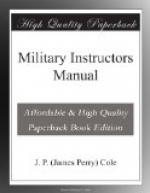1. Be surrounded by a wire
entanglement of irregular trace and as
invisible as possible.
2. In the enclosure thus created
having several firing emplacements,
in case one or more becomes useless.
3. The personnel must have
all the means for protection against gas
and have in addition rations, water and abundant ammunition.
EMPLOYMENT OF FIRE AND INSTRUCTION.
The more grazing the fire of a machine gun the more effective it is. This causes the principal employment of the machine gun to be at distances where the trajectory is flattest, that is under 800 or 1,000 yards. However, the effort to obtain a grazing fire must not exclude long distance fire. This latter will always be justified when directed upon important objectives, or necessary points of passage. For this fire to have some efficacy, it is necessary to calculate the range with the greatest precision. On the defensive indirect fire will be employed sometimes to annoy the supply, reliefs, etc. To give results, great quantities of ammunition will have to be expended. All of the officers and non-commissioned officers and as many men as possible must be capable of firing the machine gun, so that at the time of an attack no gun will remain idle for want of personnel. It is, moreover, essential to keep up the training of the personnel by having them fire at least twice a month, and, if possible, once a week.
RESUME.
Machine guns must be utilized in the greatest measure in order to economize the infantry.
Seek to employ them always in a, flank fire.
Conceal them so as to get surprise fire.
Echelon them and shelter them so as to avoid their premature destruction.
POINTS BEFORE FIRING.
1. Thoroughly overhaul the
gun to see that no part is deficient,
and that the mechanism works freely.
2. See that the barrel is clean
and dry.
3. See that the barrel mouthpiece
is tight.
4. See that small hole in gas
regulator is to the rear.
5. Thoroughly oil all working
parts, especially the cam slot and
exterior of the bolt, and the striker post and piston.
6. Weigh and adjust the mainspring.
7. See that the mounting is
firm.
8. Examine the magazines and
ammunition.
9. See that the spare parts
and oil reserve are handy.
POINTS DURING FIRING
1. During a temporary cessation of fire, re-oil all working parts. 2. Replace a partly emptied magazine with a full one. 3. Examine the mounting to see that it is firm. 4. See that empty magazines are refilled without delay.
POINTS AFTER FIRING.
1. Unload.
2. Oil the bore and chamber,
piston rod and gas cylinder.
3. Sort out live rounds from
empty cases.
4. See that mainspring is eased.
5. Thoroughly clean and oil
the gun on returning to quarters. Clean
the bore daily for several days.




